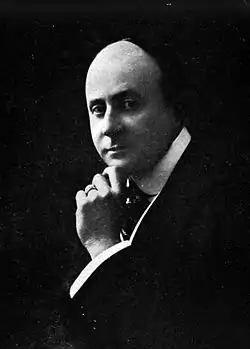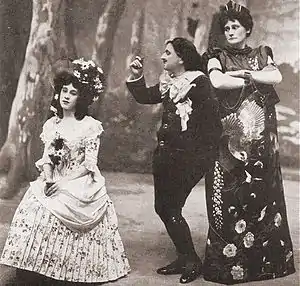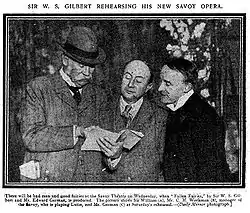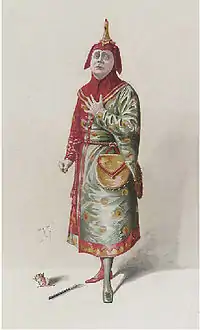Charles H. Workman
Charles H. Workman (5 May 1872[1] – 1 May 1923) was a singer and actor best known as a successor to George Grossmith in the comic baritone roles in Gilbert and Sullivan operas. He was sometimes credited as C. Herbert Workman or C. H. Workman.

Life and career
Charles Herbert Workman was born in Bootle, on the outskirts of Liverpool, Lancashire, and studied singing under his brother, Albert Edward Workman, in Liverpool.
D'Oyly Carte years
A newcomer to the stage, he joined the D'Oyly Carte Opera Company in 1894 as Calynx in a provincial tour of Utopia, Limited. In 1895, he also played the roles of Pedrillo in The Chieftain, Mr. Bunthorne's Solicitor in Patience and Pennyfather in After All!, the curtain raiser for a revival of The Mikado. Workman then created the small part of Ben Hashbaz in The Grand Duke (1896). He later created the part of Adam in F. C. Burnand and R. C. Lehmann's His Majesty (1897; appearing briefly as King Ferdinand when George Grossmith abandoned the part, until Henry Lytton took over). Workman was Simon in Old Sarah, the companion piece for the first revival of The Yeomen of the Guard (1897). In The Grand Duchess of Gerolstein that year, he also played Carl.

Beginning in 1897, Workman was promoted to principal comedian in D'Oyly Carte touring companies, appearing as the Lord Chancellor in Iolanthe, Ko-Ko in The Mikado, and Jack Point in Yeomen. He toured with D'Oyly Carte until 1906, appearing as John Wellington Wells in The Sorcerer, Sir Joseph Porter in H.M.S. Pinafore, Major-General Stanley in The Pirates of Penzance, Reginald Bunthorne in Patience, the Lord Chancellor, King Gama in Princess Ida, Ko-Ko, Jack Point, the Duke of Plaza-Toro in The Gondoliers, and Scaphio in Utopia. He also appeared as Hassan in The Rose of Persia (1901) and as the Learned Judge in Trial by Jury beginning in 1904. After a brief tour of South Africa with his own company[2] he returned to the Savoy Theatre in 1906 and played the principal comedian roles created by George Grossmith for the company's repertory seasons there and on tour with the company, until 1909, except that he never played a role in Ruddigore, as that opera was not in the D'Oyly Carte repertory during his tenure.
In 1907, The Times wrote, "As the Duke of Plaza-Toro, Mr. Workman surpasses both his predecessors".[3] Of his Jack Point, the paper wrote: "His patter is delivered with a clearness that neither of the older performers could surpass; he dances as lightly as either, and has as spontaneous a sense of fun. His was the chief triumph of Saturday night."[4] However, The Times warned Workman, "in Patience [he] makes the grave mistake of trying to add fun of his own by clowning to the part of Bunthorne. He is too clever an actor to be allowed to go on in this path without warning."[5] Workman redeemed himself in Iolanthe: "The Lord Chancellor of Mr. Workman is a masterpiece, and the whole audience were of one mind as to the double encore for the dancing trio, and the 'Nightmare' song was sung with marvellous glibness."[6]
In Yeomen, when Workman was playing Jack Point, in one scene he stood between the ladies portraying Elsie Maynard and Phoebe Meryll. Workman wrote: "I used to kiss the cheek of first one and then the other, quickly and repeatedly, and Sir William thought there was too much kissing for a Savoy audience. 'You would cut the kissing, then?' I said. 'I would not', he returned drolly, 'but I must ask you to.'"[7]
After D'Oyly Carte

Workman then left the D'Oyly Carte organisation and became an actor-manager. He leased the Savoy and produced two comic operas: Eden & Somerville's The Mountaineers (1909), appearing as Pierre, and W. S. Gilbert and Edward German's Fallen Fairies (1909), appearing as Lutin. He then produced an Edwardian musical comedy, Two Merry Monarchs (1910), appearing as Rolandyl, and an opera, Gluck's Orpheus, (1910).
None of these was a financial success. The production of Fallen Fairies was particularly disappointing, leading to a serious battle between Workman and Gilbert. Workman expected Gilbert's libretto, based on Gilbert's successful earlier play The Wicked World, to be followed by more works with the dramatist.[8] However, Workman and his financial backers quarrelled with Gilbert over the casting of the librettist's protégée, Nancy McIntosh, as Selene, the Fairy Queen. At the end of the first week of the run, Workman replaced McIntosh. Gilbert angrily forbade Workman from ever again appearing in any of his works on stage in the United Kingdom, although Gilbert could not enforce a prohibition elsewhere or in the recording studio.[9] In 1910 and 1911, Workman recorded songs, mostly patter songs, for Odeon. Nineteen of these songs were re-issued by Pearl in 1974.[10] It is likely that, but for this conflict, Workman would have continued as principal comedian for the D'Oyly Carte company.[11]

Workman continued his acting career in London, earning good notices, in The Chocolate Soldier (1910–11, running for 500 performances), Nightbirds (1911) and The Girl in the Taxi (1912–13). In 1914, he travelled to Australia where he once again appeared in Gilbert and Sullivan operas with the J. C. Williamson Gilbert and Sullivan Opera Company (1918 and thereafter). In 1919, Rupert D'Oyly Carte wrote to Workman asking him to return to the D'Oyly Carte company: "We intend to present Gilbert and Sullivan at the Savoy again, and if we knew you would be coming to London, we would await your arrival, so that your reappearance and the revival of Gilbert and Sullivan opera might be made two important simultaneous events. You will, of course, play all your old parts. Excellent news, this, if it materialises." Workman declined.[12]
In Australia in 1920, Workman appeared in the "mystery musical comedy" F.F.F.[13] He also played Ali Baba in the first Australian production of Chu Chin Chow (1920–21) alongside Louie Pounds as Alcolom.[14] In 1922–23, he led a tour of India and east Asia with his wife, Bessel Adams, a former D'Oyly Carte singer, playing in Gilbert and Sullivan, again with J. C. Williamson's company. Adams died on that tour in February 1923 in Calcutta. Workman died at sea in May 1923, just short of his 51st birthday, in a steamer outside Hong Kong, returning from the same tour.
Recordings
Workman recorded over a dozen songs from his G&S repertoire for Odeon in 1910, and several more in 1912. Many of these have been re-issued Pearl on LP and CD ("The Art of the Savoyard," Pearl GEMM CD 9991).
References
- Birth registration, June 1872 quarter, West Derby registration district, volume 8b, page 469
- UK and Ireland, Incoming Passenger Lists, 1878–1960 for C. H. Workman, Southampton, England, 1906, Aug: Ancestry.com (subscription required)
- The Times review of The Gondoliers , 23 January 1907
- The Times review of The Yeomen of the Guard , 10 December 1906
- The Times review of Patience , 5 April 1907
- The Times review of Iolanthe , 12 June 1907
- Workman, C. H. "Recollections of Sir W. S. Gilbert", The Bookman, vol. 40, no. 238, July 1911, p. 165
- Shepherd, Marc. "Introduction: Historical Context", The Grand Duke (piano score), p. xxvii, New York: Oakapple Press, 2009. Linked at "The Grand Duke", The Gilbert and Sullivan Archive
- Morrison, Robert. "The Controversy Surrounding Gilbert's Last Opera", The Gilbert and Sullivan Archive, accessed 15 July 2020
- Shepherd, Marc. "G&S Vintage Compilations of Oldham/Lytton/Workman", Archived 31 December 2008 at the Wayback Machine A Gilbert and Sullivan Discography, accessed 3 May 2009
- Murray, Roderick. "A review of Lytton – Gilbert and Sullivan's Jester by Brian Jones" in The Gaiety (Summer, 2006)
- Howarth, Paul. Fallen Fairies cast information at The Gilbert and Sullivan Archive, 19 March 2005, accessed 4 November 2009
- "Music and Drama: King's F.F.F.", Argus, 11 October 1920, p. 8, accessed 8 December 2019
- Gänzl, Kurt. "Chu Chin Chow Musical Tale of the East In 3 Acts, Music by Frederic Norton", Operetta Research Center, 9 July 2016
- Ayre, Leslie (1972). The Gilbert & Sullivan Companion. London: W.H. Allen & Co Ltd. Introduction by Martyn Green.
External links
- C. H. Workman at "Who Was Who in the D'Oyly Carte
- Profile of Workman
- Biography of Workman and discussion of his recordings
